#and there are numerous examples of small gestures of affection or collaboration or a desire to keep each other safe
Note
hey, i was wondering if you had an opinion on why the carian children’s alliance fell apart during the shattering. between rykard having invented the abductor virgins that both ranni and radahn employ, and jerren stating that iji forged weapons for radahn’s army (if you talk to him about iji before the radahn festival while working for ranni), it seems the carians were helping each other out at the start. i have a few theories already, but i love your elden ring meta
first of all thank you!!
yeah I have a lot of thoughts about this. I think it ultimately comes down to the fact that their personal goals are entirely different and really don’t have anything to do with each other.
Radahn seems the most disconnected of the siblings in terms of his actions — judging by what we know, it doesn’t seem like a total upheaval of the current order was a priority for him as it was for his siblings. His specific motivations remain pretty opaque, but I believe, based on his obsession with Godfrey and all the references to honor and combat, that at his core he made the choices he did in order to prove his own strength and heroism.
I suspect this is why his halting of the stars hindered Ranni’s plans — he was never acting with her interests in mind. I doubt he was intentionally sabotaging her though, because there is no evidence of he and Ranni ever feuding. I’ve said this before, but the idea that Radahn’s halting of the stars is specifically holding Ranni back is a total afterthought to Iji… if Ranni were convinced Radahn bore her ill-will, killing him wouldve been her team’s objective years ago. Plus, Iji and Jerren are still amicable as you said. I think the situation is simply that, as Iji says, he and Jerren serve different masters with different priorities. The same goes for Radahn’s relationship with Rykard — I believe it’s implied Rykard tried to protect Radahn, but I don’t think this protection necessarily meant the two were working towards the same goals.
Rykard and Ranni are more complicated… I believe the Blasphemous Claw description implies that before the Night of the Black Knives, the two talked of a wider plan to “trespass” against the current world order: “Should the coming trespass one day transpire, they would serve as a last-resort foil, allowing Rykard to challenge Maliketh the Black Blade, the black beast of Destined Death.” Since there is evidence that these two did share plans with each other, it’s significant that they don’t really have anything to do with each other anymore.
I think this is due to the fact that though their goals were the same on paper — remove and usurp the current world order — their motivations and personalities are quite different.
Ranni is motivated by a desire to rid the world of godly influence because, as I believe, she owes her life’s misery to the gods’ meddling. She has no interest in ruling the Lands Between as a god-queen; rather, she intends for herself and her order to be “at great remove” from the goings on of the world. As god, she will be completely non-present.
Rykard very specifically does want to rule. He had great ambitions; his followers planned to serve him as their “worthy sovereign.” He despises being treated as a servant under the gods and having to fight for “miserly scraps” of power… he dedicated his life to destroying an order he believes is “suffocating,” asserting his own strength and authority in retaliation, operating under the philosophy of “the strong take.” At his core, Rykard’s goal was always the acquisition of power for his own benefit… and I believe this is why he ended up entangled with the Great Serpent, devouring and growing eternally, never satisfied… a caricature of greed and gluttony. Rykard’s personal goals essentially have nothing to do with Ranni’s far-reaching plans for a new order, and I think that’s why the two ended up on very different paths instead of working together.
I also think it’s interesting that Ranni and Rykard go about their plans in very different ways: Ranni prefers to work in the shadows and strike when the moment is right, keeping a cool head and a clear mind, trying to stay detached. She is said to have “cast aside” her great rune, probably because she distrusted its “mad taint.” Rykard on the other hand is rash and volatile, carrying out his treason in spectacularly public fashion. He is ruled by his ambition and hubris, clinging to the power afforded to him by his great rune.
In conclusion I don’t think there was ever a chance of the siblings all being on the same page — they’re each too different from one another with their own lofty goals and priorities, despite the love they might have for each other.
#elden ring#radahn#rykard#ranni#asks#its evident in the game that the three had genuine love for one another#and there are numerous examples of small gestures of affection or collaboration or a desire to keep each other safe#but alas this didnt seem to have extended to a genuine coordinated effort between the three of them
85 notes
·
View notes
Text
let’s talk about aziraphale’s self-delusion!
so, i originally wrote the following analysis in response to this post’s reblog. but as notes rarely seem to get looked at, i’ve decided to post it on its own (with some additions/minor edits and relevant screenshots).
(to thesis the op: i enjoyed a lot how the good omens tv show characterized aziraphale as someone trying to maintain the best of two worlds—loyalty to heaven and the archangels, and his relationship with crowley—while in denial about the contradictions and dilemmas inherent in trying to maintain it. it’s the good omens tv show that has the figure of “good” unable to accept his desire for love and companionship, and the figure of “evil” comfortable with freely offering those to him.
@jacquez45 specifically brought up the idea that aziraphale’s reluctance to be close to crowley had a lot more to do with his fear of punishment from heaven (namely Falling) than a sense of identity as an angel. i disagreed.)
part of my perspective on aziraphale’s “blind loyalty” is that, well, it’s a blindfold that he has tied on himself. i didn’t quite elaborate on it in the original post, but i view aziraphale throughout the show as continually operating on multiple levels of awareness. he knows that the potential consequences for disobeying (Falling, the cruelty of heaven) are severe. and that in itself does raise doubts in him. but doubt is bad, and so he ties on the blindfold and smothers his doubts, pretending that his increasing laxness isn’t exactly that.
i don’t quite agree that it’s fear of the punishment motivating him. if it was, i think aziraphale would display a much stronger strictness of self-regulation and an openness about that fear. despite his numerous interactions with crowley on-screen, we almost never see aziraphale allude to the possibility of Falling so much as his sense of identity as “the angel.”
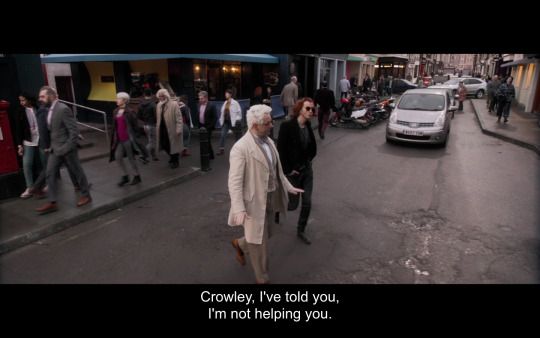
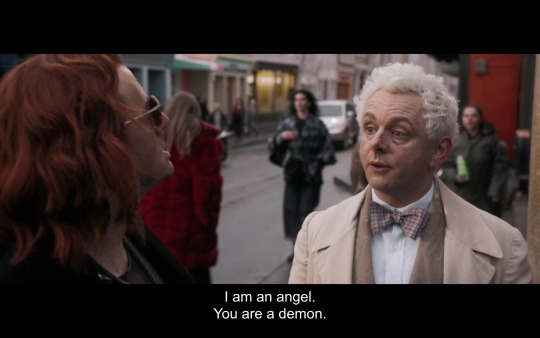
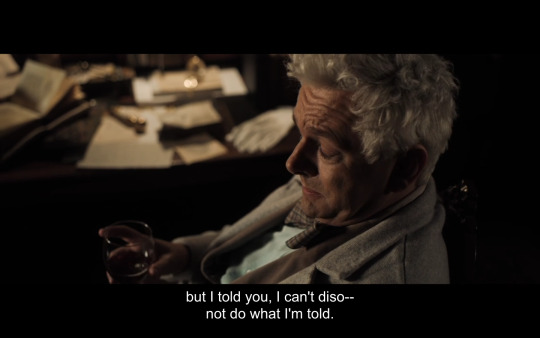

considering how he still brings up crowley’s risking destruction, it wouldn’t be out of bounds for aziraphale—who is and has always been, since he gave away his sword and worried over whether it was right to a demon, rather self-preoccupied and vocal about it—to bring up a Fall as a deterrent to crowley once he realized their relationship was more meaningful than a long con.
as for the archangels, he definitely tip-toes around them, but outside of them? he collaborates with a demon, indulges in vices, and has (in his heart of hearts) become a bit static in his role as an angel. although we see crowley doing an assortment of hellish deeds (the M25, the london mobile phone lines, the paintball guns), the most we see from aziraphale in terms of heavenly duties in the relative present is “thwarting” the antichrist, an act in stretching logic and bounds so aziraphale can feel secure in acting in his self-interest.
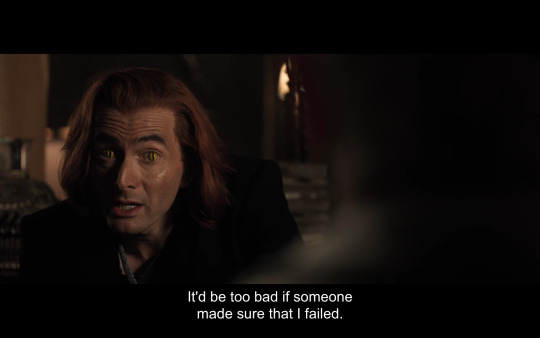
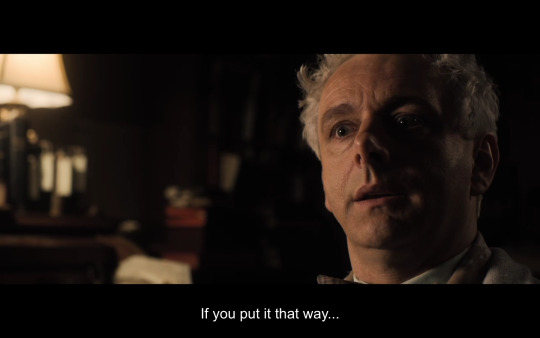
it’s not the archangels that decide whether an angel Falls. otherwise, he would have by the end of the show. the determiner is god, who is all-knowing and all-powerful and absolutely would be aware of aziraphale’s every doings and thoughts. if Falling were such an important concern to him, self-vigilance would have to be a constant presence in his behavior.
yet aziraphale lounges in his bookshop whiling away the days, trying to discourage encounters with the very people he was put on the planet to inspire, drinking wine and indulging in human foods.
and being best friends with a demon.
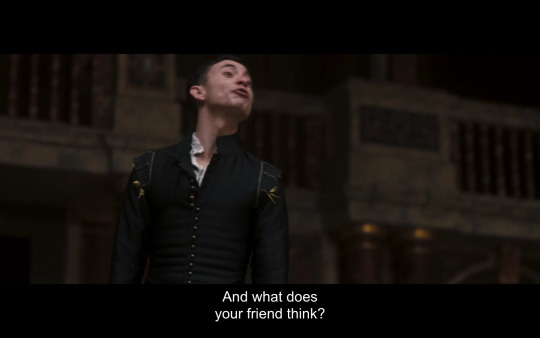
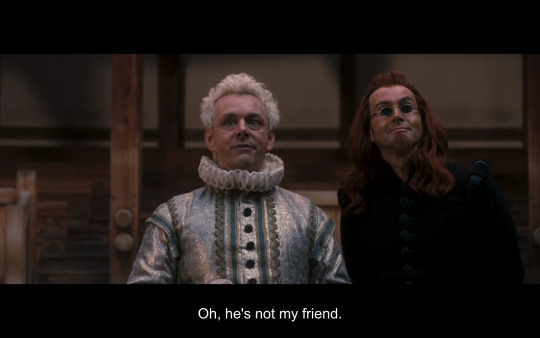
essentially: the huge conflict in aziraphale’s arc isn’t fear of Falling, which could come anywhere at any time if he slipped far enough (and thus overcoming that fear), it’s his numerous self-delusions in pursuit of sameness and stability.
his costume design is always decades or centuries out of date with articles of clothing he’s kept for even longer. the ways he is persuaded to deviate from the ideal angelic path are to preserve the human indulgences he enjoys, both big (the apocalypse to preserve his earthly life) and small (using his arrangement with crowley to stay at the globe to help shakespeare instead of performing his assigned duty, indirectly lying about the purpose of his “bookshop” to preserve his collection). in the rejections and reasons he puts to voice, part of what blocks him from a close relationship with crowley is this slowness (“you go too fast for me”) in a show written deliberately as a love story.
most importantly, he continually puts to voice what is expected of him as an angel while falling short of it in reality. this suggests that his concerns are not actually with reality, and the possible consequences of such, but with his internal sense of self and comfort.
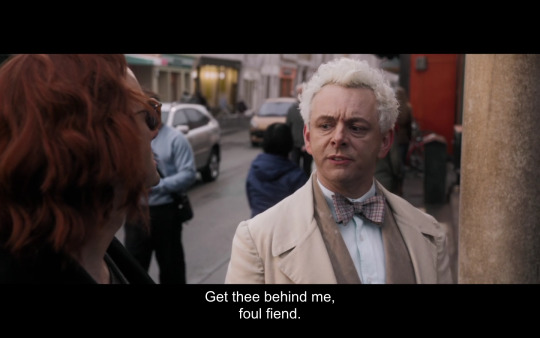
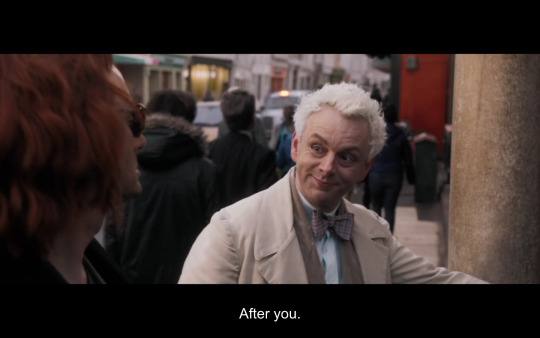
(addition: i didn’t elaborate on the above images in the op, but i will here. it’s a clear example of a characterizing moment where aziraphale asserts a boundary based on his ideal sense of self—his angelic status and thus unfriendliness to a demon—while then contradicting it in practice by smiling and offering politely for crowley to enter first, notably instead of being literally “behind” aziraphale. as early as it is in the show, this exchange also functions as an establishing moment for his character and their relationship, and the ironic juxtaposition makes clear how aziraphale’s more direct statements of identity don’t often align with his behavior.
(importantly as well, the turning point of aziraphale’s arc, in which he finally decides to reject heaven’s orders in favor of saving earth, has nothing to do with Falling. rather, it is his acceptance of two things:
(how he fails to live up to being the ideal angel...
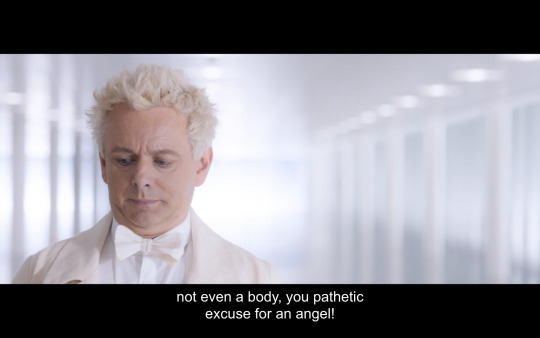
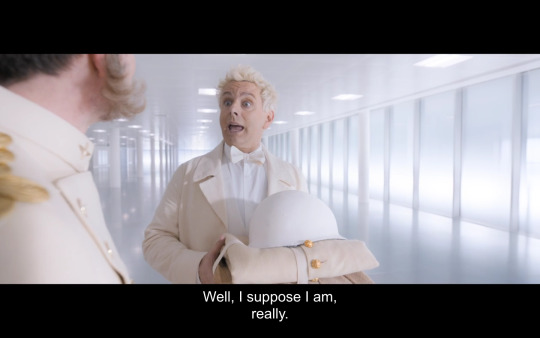
(... and how he is ultimately of the same stock as the demons, and thus crowley, which would allow him to possess a human. a rather demonic action for an angel to do.

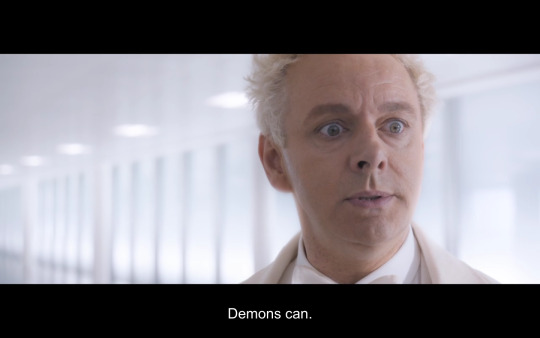
(what allows aziraphale to overcome the obstacle to his happy ending is his acceptance that there is, in fact, little difference between angels and demons.)
further points in aziraphale’s character design that allude to his preoccupations with the “unsaid” and “unthought” is his tendency to avoid directly acknowledging what discomforts him and to communicate through subtext.
in the globe theatre flashback, early in the creation of the arrangement, he takes offense to what crowley is “implying” and insists that he not refer to it as the arrangement it is. and when he manipulates crowley into taking the trip to edenburgh, he doesn’t actually say anything.
he merely takes the opportunity to look at him significantly...
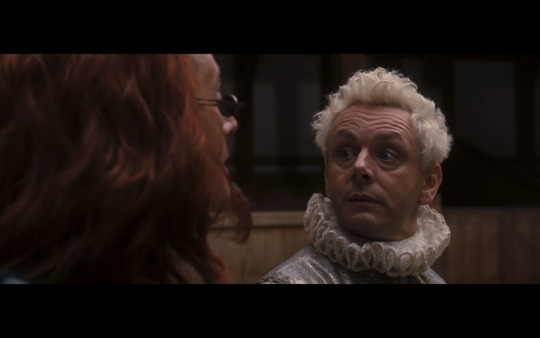
... and then pretends to accept crowley’s favor as a generous and unforeseen offer instead of a deliberate result of his asking.
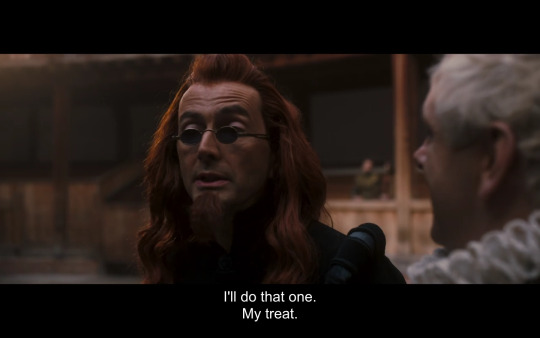

this happens again in a similar manner in the present, when they’re hit by paintballs in the ex-nunnery courtyard and crowley miracles the paint from his jacket for him. again, aziraphale doesn’t acknowledge crowley’s affection by making a direct request; only plies the gesture from him through suggestion and a look.
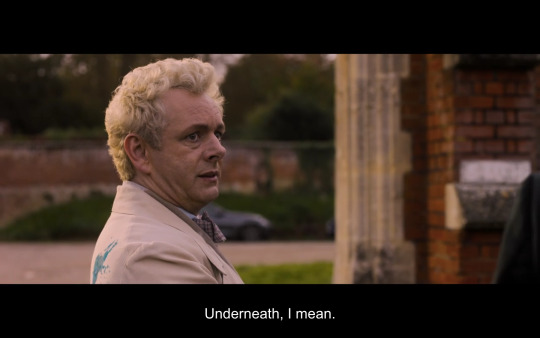
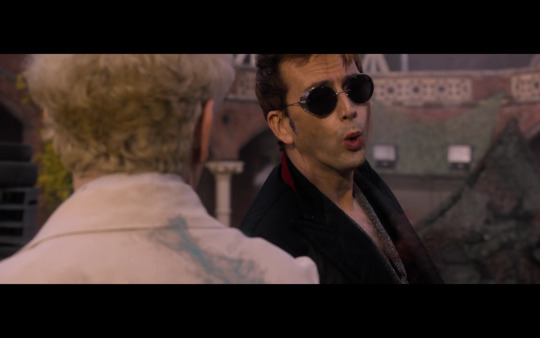
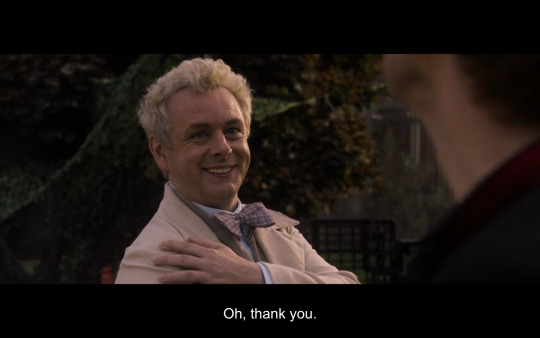
in the st james’s park meeting over holy water, too, aziraphale refers to their relationship as “fraternising,” even though the resulting spat makes it clear that their relationship is (whether acknowledged or not) rather more than that. and the conversation in the car in the 1960s is (rather famously in fandom) all about the subtext.
this is where aziraphale directly does something for crowley, giving him holy water, that very clearly makes him uncomfortable.
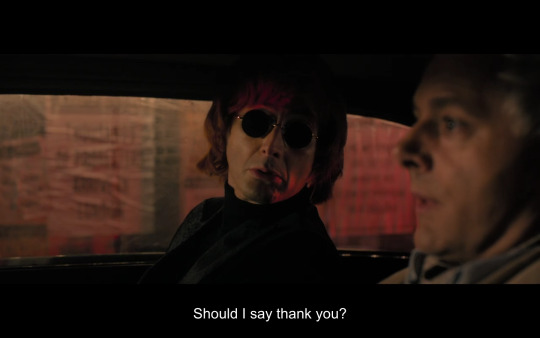
crowley asks him if he should say “thank you,” an acknowledgment of the favor and how significant it is.

aziraphale says, “better not,” a rejection of the thanks even as the choice of words softens the rejection itself.
not only because heaven would dislike the act happening here. but because aziraphale dislikes it out of fear that crowley will kill himself with the holy water. and that means he cares for crowley. the conflict over the holy water is the closest that aziraphale comes in the past we see to voicing how much he values their relationship.
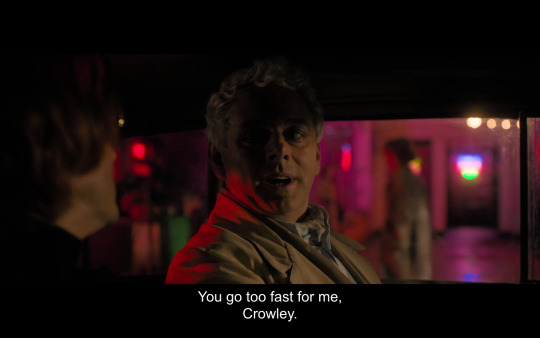
and in the end, he couches it in crowley’s offers to give him a lift.
this avoidance is particularly on display in the bandstand scene, the climactic moment of their relationship in which crowley directly addresses the strength of their relationship. he asks aziraphale to run away with him. he states outright that they’ve been friends for 6000 years.
and aziraphale freaks out.
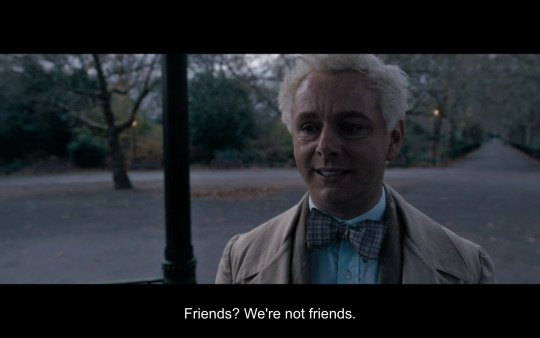

(addition: see again that re-assertion of their angel and demon identities!)

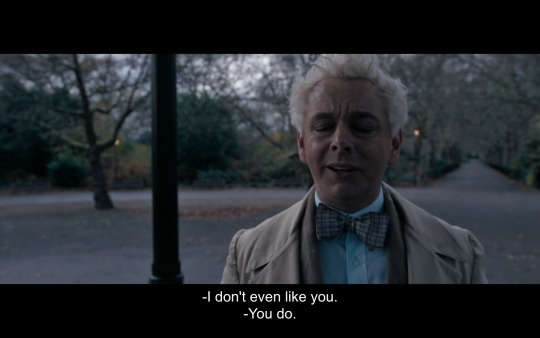
he not only dives headfirst into blatant denial, he deliberately pushes crowley away in a similar manner to the “fraternising” line by revealing that he’s known where the antichrist is for a while and has avoided telling him so because they’re on opposite sides—when for the longest time, as crowley says, they have both acted far more as if they’re on their own side.
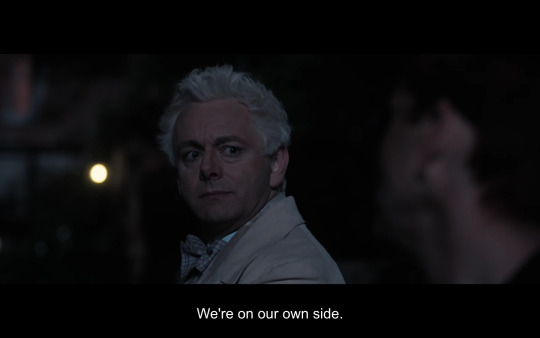
i do agree that aziraphale is frightfully aware of the possibility of Falling. but i don’t think it’s a main motivator for his behavior, so much as one out of many truths that he puts so much effort into ignoring.
aziraphale’s primary conflict throughout the show is not fear of Falling. it’s that he has a deeply-held image of what kind of person he is and the kinds of things he does that are dissonant with reality. and his efforts to maintain and ignore that dissonance create problems once the stress of the impending apocalypse causes that precarious balance to collapse.
#good omens#ineffable husbands#aziraphale#crowley#aziracrow#good omens meta#good omens analysis#good omens spoilers#prim post#prim says some things#long post#readmore#bc this post is even longer than the op :')#it's been bothering me for so long that hardly anyone read this shjdfgdkgfh so here it is as a somewhat-standalone
42 notes
·
View notes